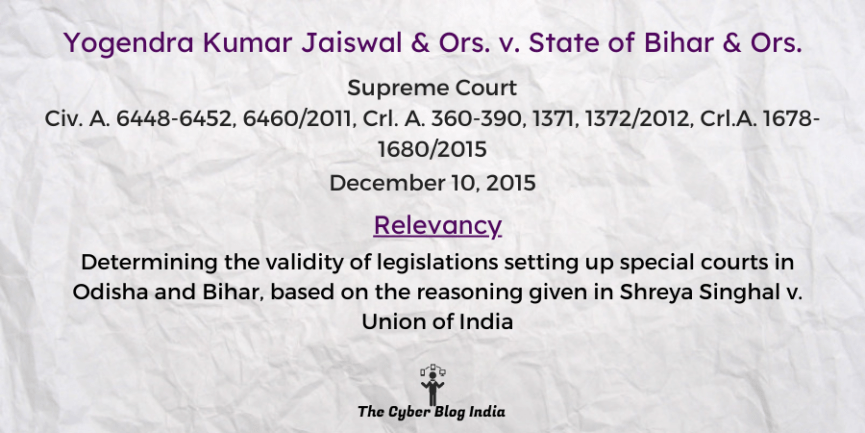Yogendra Kumar Jaiswal & Ors. v. State of Bihar & Ors.

Yogendra Kumar Jaiswal & Ors. v. State of Bihar & Ors.
(2016) 3 SCC 183
In the Supreme Court of India
Civ. A. 6448-6452, 6460/2011, Crl. A. 360-390, 1371, 1372/2012, Crl.A. 1678-1680/2015
Before Justice Dipak Misra and Justice Anil R. Dave
Decided on December 10, 2015
Relevancy of the case: Determining the validity of legislations setting up special courts in Odisha and Bihar, based on the reasoning given in Shreya Singhal v. Union of India
Statutes and Provisions Involved
- The Information Technology Act, 2000 (Section 79)
- The Prevention of Corruption Act, 1988 (Section 13(1)(e))
Relevant Facts of the Case
- Odisha and Bihar introduced the Special Court Acts for their respective states that gave certain courts special powers to conduct speedy trials and confiscate properties acquired beyond known means in corruption cases.
- These acts allowed to confiscate monies and properties of the public servants, even before the corruption trial begins.
- The Odisha law dealt with offences under Section 13(1)(e) Prevention of Corruption Act, 1988.
Prominent Arguments by the Advocates
- The petitioner’s counsel argued the Orissa Act is vague, encroached on the Prevention of Corruption Act, 1988, gave too much power to the executive, and was discriminatory in nature.
- The respondent’s counsel argues that the Orissa Act is in accordance with the laws and does not give scope for the arbitrary exercise of power.
- The respondent’s counsel submits that the other legislations are not being encroached as the operations of the current act are different.
Opinion of the Bench
- The court held that the Prevention Of Corruption Act, 1988, allows states to set up special courts.
- It was also held that the Odisha Act was not repugnant to the other legislations, as the President’s assent was taken on general terms.
- Further, there is sufficient guidance in the law to determine what is meant by ‘high powered officials’, and there is no arbitrariness.
- The court relying on Shreya Singhal v. UoI, where Section 79 was read down, stated that due consideration had to be given to the text, context, and the legislative intent. As the principle of reading down could only be applied to save a law from constitutional invalidity.
- The State Government has no discretion except to see if the offence comes under Section 13(1)(e) or not. The State Government has no authority to scrutinize the material for any other purpose.
- Further, Section 13(1)(e) is distinct from its counterparts as it dealt with the acquisition of disproportionate assets.
- Further, it said that confiscation of the property before the trial began was not an additional punishment.
Final Decision
- The Supreme Court declared the two laws passed by Odisha and Bihar state legislatures to be constitutional.
This case summary has been prepared by Mehula Liza Pallathu, an undergraduate student at the National University of Advanced Legal Studies, Kochi, during her internship with The Cyber Blog India in May/June 2021.
